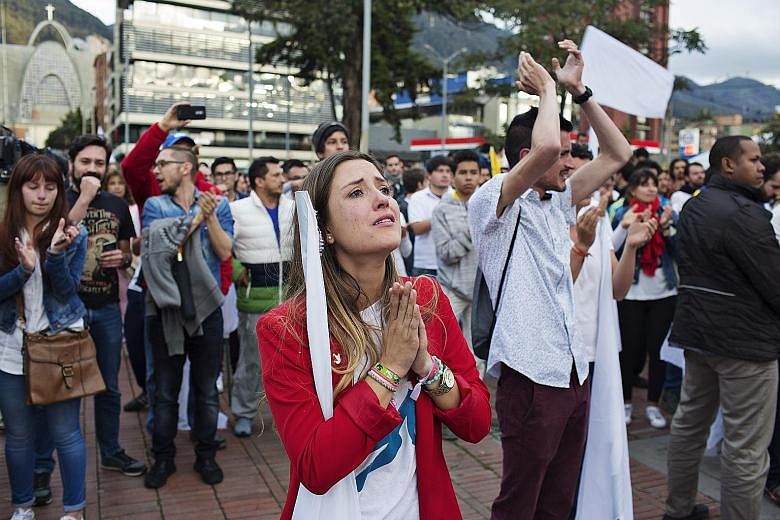BOGOTA • Colombia's government and Marxist guerillas are scrambling to revive a plan to end their 52-year war after voters rejected a peace deal as too lenient on the rebels in a shock result that plunged the nation into uncertainty.
A narrow margin divided the yes-or-no vote, with 50.2 per cent of Colombians rejecting the peace deal and 49.8 per cent voting in favour, the government said. The result was a deep embarrassment for President Juan Manuel Santos.
Only last week, he had joined hands with leaders of the Revolutionary Armed Forces of Colombia, known as the Farc, who apologised on national television during a signing ceremony.
The surprise surge by the "no" vote - nearly all major polls had indicated resounding approval - left the country in a dazed uncertainty not seen since Britain voted in June to leave the European Union.
And it left the future of rebels who had planned to rejoin Colombia as civilians - indeed, the future of the war itself, which both sides had declared over - unknown.
Mr Santos, 65, who was not obliged by law to hold a plebiscite and had said there was no Plan B for the failure of the peace vote, appeared humbled on television on Sunday.
He said the ceasefire his government had signed with the Farc would remain in effect, adding that he would soon "convene all political groups", especially those against the deal, "to open spaces for dialogue".
Farc leader Rodrigo Londono, better known by his nom de guerre Timochenko, who was preparing to return home after four years of negotiations in Havana, said he, too, was not interested in more war.
He said in a statement: "With today's result, we know that our challenge as a political party is even greater and requires more effort to build a stable and lasting peace."
The question voters were asked was simple: "Do you support the final agreement to end the conflict and construct a stable and enduring peace?"
But it was one that had divided the country for generations, as successive governments fought what seemed a war without end and Marxist rebels dug into the forest for what amounted to a hopeless insurgency.
To many Colombians who had endured years of kidnappings and killings by the rebels, the agreement was too lenient. It would have allowed most rank-and-file fighters to start lives as normal citizens, and rebel leaders to receive reduced sentences for war crimes.
Under the peace accord, the Farc, which began as a peasant revolt in 1964, would have been able to compete in the 2018 presidential and legislative elections, and have 10 unelected congressional seats guaranteed through 2026.
That enraged "no" supporters, including powerful former president Alvaro Uribe, who argued that the rebels should serve jail terms and never allowed into politics.
"It seems Colombia has forgotten about the cruelty of war, our deaths, our injured, our mutilated, our victims and the suffering we've all lived through with this war," said Ms Adriana Rivera, 43, a philosophy professor who stood tearfully at the hotel of the "yes" campaign.
REUTERS, NYTIMES

